#writers memoir learning
Video
youtube
Being different is someone else's problem. You only feel that way when you let it affect you.
0 notes
Text
"We noticed immediately how often the local citizens used the word 'black'. We were accustomed to the use of the word as an adjective, not as a racial designation. Of course, we had heard it when it was meant to be derogatory. (Twenty years later we were beginning to accept that designation, with pride and dignity.)"
-Lt. Col. Charity Adams Earley, in reference to her posting in the UK as the commander of the only unit of black American women to serve overseas during WWII
#this got my attention because I thought immediately about Eugene Roe referring to 'the black girl' in Band of Brothers#and I'm 100% sure that the writers of BoB did not bother to look up the history of racism#so it was not intentional#but worthy of note that they managed to bungle both Anna's real name (which was Augusta)#and also the only other way another character refers to her#anyway i'm really enjoying Earley's memoir called One Woman's Army#i'm learning a lot!#wwii#women's army corps#charity adams earley#one woman's army#american history
6 notes
·
View notes
Text
Hard NOC Life 307: 'Everything I Learned, I Learned in a Chinese Restaurant'
On another special episode of Hard NOC Life, Keith sits down with documentary filmmaker and co-founder of the Asian American Writer’s Workship, Curtis Chin, to discuss his new memoir, Everything I Learned, I Learned in a Chinese Restaurant, which will be available in bookstores everywhere this October.
https://dts.podtrac.com/redirect.mp3/traffic.libsyn.com/thenerdsofcolor/HNL307.mp3
(more…) “”
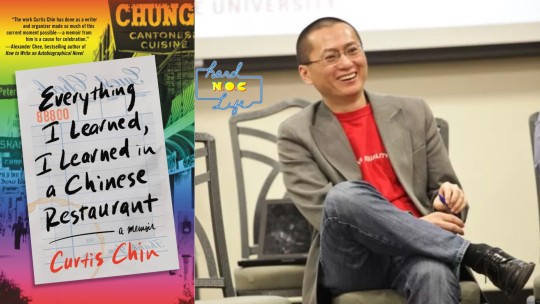
View On WordPress
#Asian American#Asian American Writers Workshop#Autobiography#Chinese American#Chinese Food#Corky Lee#Curtis Chin#Detroit#Documentaries#Everything I Learned#food#Hard N.O.C. Life#Hard NOC Media#I Learned in a Chinese Restaurant#Interview#Little Brown#memoir#Podcasts#politics#restaurant#Vincent Chin#Vincent Who
0 notes
Text
#classes#writing#poem#short story#malinowski#workshop#prompts#courses#memoir#authentic#writers on tumblr#writing prompt#writerscommunity#writer things#pleasant#learn more
1 note
·
View note
Text
Asexual Non-Fiction
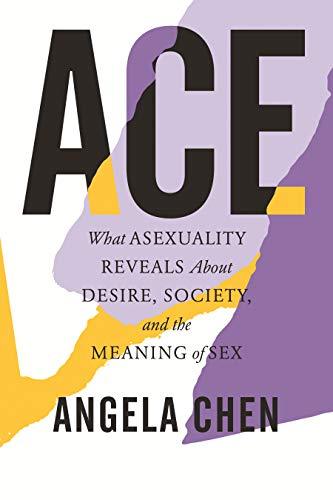

Ace: What Asexuality Reveals About Desire, Society, and the Meaning of Sex by Angela Chen
An engaging exploration of what it means to be asexual in a world that's obsessed with sexual attraction, and what we can all learn about desire and identity by using an ace lens to see the world. Through interviews, cultural criticism, and memoir, ACE invites all readers to consider big-picture issues through the lens of asexuality, because every place that sexuality touches our world, asexuality does too.
The Invisible Orientation: An Introduction to Asexuality by Julie Sondra Decker
In The Invisible Orientation, Julie Sondra Decker outlines what asexuality is, counters misconceptions, provides resources, and puts asexual people's experiences in context as they move through a very sexualized world. It includes information for asexual people to help understand their orientation and what it means for their relationships, as well as tips and facts for those who want to understand their asexual friends and loved ones.

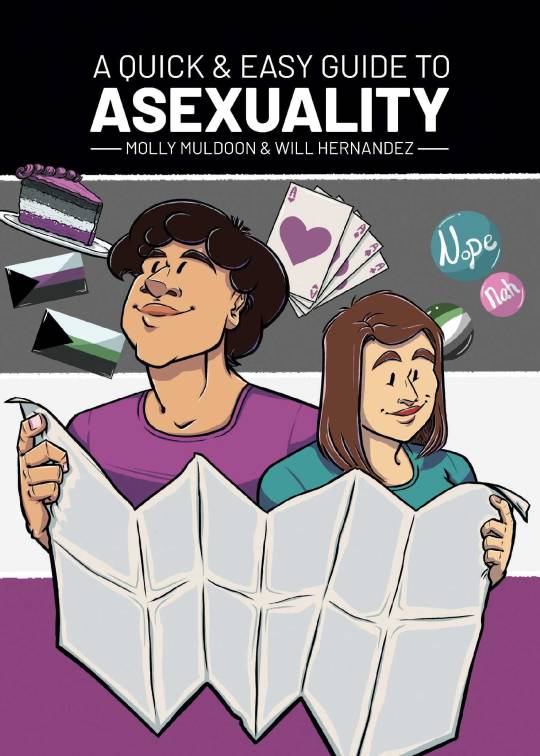
How to Be Ace: A Memoir of Growing Up Asexual by Rebecca Burgess
In this brave, hilarious and empowering graphic memoir, we follow Rebecca as they navigate a culture obsessed with sex—from being bullied at school and trying to fit in with friends, to forcing themself into relationships and experiencing anxiety and OCD—before coming to understand and embrace their asexual identity.
A Quick & Easy Guide to Asexuality by Molly Mulldoon and Will Hernandez
Writer Molly Muldoon and cartoonist Will Hernandez, both in the ace community, are here to shed light on society’s misconceptions of asexuality and what being ace is really like. This book is for anyone who wants to learn about asexuality, and for Ace people themselves, to validate their experiences. Asexuality is a real identity and it’s time the world recognizes it. Here’s to being invisible no more!


Asexualities: Feminist and Queer Perspectives edited by Karli June Cerankowski and Megan Milks
As the first book-length collection of critical essays ever produced on the topic of asexuality, this book serves as a foundational text in a growing field of study. It also aims to reshape the directions of feminist and queer studies, and to radically alter popular conceptions of sex and desire. Including units addressing theories of asexual orientation; the politics of asexuality; asexuality in media culture; masculinity and asexuality; health, disability, and medicalization; and asexual literary theory, Asexualities will be of interest to scholars and students in sexuality, gender, sociology, cultural studies, disability studies, and media culture.
Refusing Compulsory Sexuality: A Black Asexual Lens on Our Sex-Obsessed Culture by Sherronda J. Brown
In this exploration of what it means to be Black and asexual in America today, Sherronda J. Brown offers new perspectives on asexuality. She takes an incisive look at how anti-Blackness, white supremacy, patriarchy, heteronormativity, and capitalism enact harm against asexual people, contextualizing acephobia within a racial framework in the first book of its kind. A necessary and unapologetic reclamation, Refusing Compulsory Sexuality is smart, timely, and an essential read for asexuals, aromantics, queer readers, and anyone looking to better understand sexual politics in America.
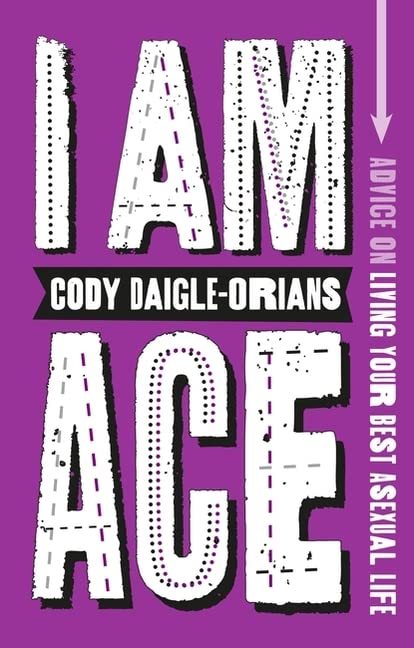

I Am Ace: Advice on Living Your Best Asexual Life by Cody Daigle-Orians
Within these pages lie all the advice you need as a questioning ace teen. Tackling everything from what asexuality is, the asexual spectrum and tips on coming out, to intimacy, relationships, acephobia and finding joy, this guide will help you better understand your asexual identity alongside deeply relatable anecdotes drawn from Cody's personal experience. Whether you are ace, demi, gray-ace or not sure yet, this book will give you the courage and confidence to embrace your authentic self and live your best ace life.
Ace Voices: What it Means to Be Asexual, Aromantic, Demi or Grey-Ace by Eris Young
Drawing upon interviews with a wide range of people across the asexual spectrum, Eris Young is here to take you on an empowering, enriching journey through the rich multitudes of asexual life. With chapters spanning everything from dating, relationships and sex, to mental and emotional health, family, community and joy, the inspirational stories and personal experiences within these pages speak to aces living and loving in unique ways. Find support amongst the diverse narratives of aces sex-repulsed and sex-favourable, alongside voices exploring what it means to be black and ace, to be queer and ace, or ace and multi-partnered - and use it as a springboard for your own ace growth.
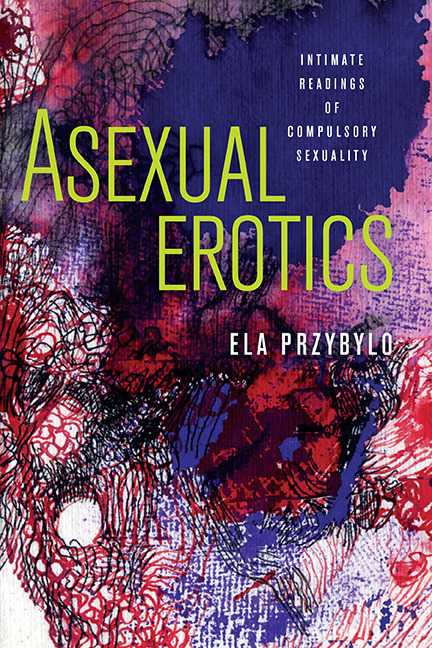

Asexual Erotics: Intimate Readings of Compulsory Sexuality by Ela Przybylo
Through a wide-ranging analysis of pivotal queer, feminist, and anti-racist movements; television and film; art and photography; and fiction, nonfiction, and theoretical texts, each chapter explores asexual erotics and demonstrates how asexuality has been vital to the formulation of intimate ways of knowing and being. Asexual Erotics assembles a compendium of asexual possibilities that speaks against the centralization of sex and sexuality, asking that we consider the ways in which compulsory sexuality is detrimental not only to asexual and nonsexual people but to all.
Ace Notes by Michele Kirichanskaya
As an ace or questioning person in an oh-so-allo world, you're probably in desperate need of a cheat sheet. Covering everything from coming out, explaining asexuality and understanding different types of attraction, to marriage, relationships, sex, consent, gatekeeping, religion, ace culture and more, this is the ultimate arsenal for whatever the allo world throws at you.


Ace and Aro Journeys: A Guide to Embracing Your Asexual or Aromantic Identity by The Ace and Aro Advocacy Project
Join the The Ace and Aro Advocacy Project (TAAAP) for a deep dive into the process of discovering and embracing your ace and aro identities. Empower yourself to explore the nuances of your identity, find and develop support networks, explore different kinds of partnership, come out to your communities and find real joy within. Combining a rigorous exploration of identity and sexuality models with hundreds of candid and poignant testimonials - this companion vouches for your personal truth, wherever you lie on the aspec spectrum.
Sounds Fake But Okay: An Asexual and Aromantic Perspective on Love, Relationships, Sex, and Pretty Much Anything Else by Sarah Costello and Kayla Kaszyca
Drawing on Sarah and Kayla's personal stories, and those of aspec friends all over the world, prepare to explore your microlabels, investigate different models of partnership, delve into the intersection of gender norms and compulsory sexuality and reconsider the meaning of sex - when allosexual attraction is out of the equation.
2K notes
·
View notes
Text
I'm a little frustrated making this scrapbook because I had the idea to put some quotes from grandma's memoirs into it both to give it a little more color and to create a more intentional sense of narrative because grandma didn't always keep things that were historically significant- she kept movie tickets and play programs. And I wanted to combine the 'life at home' visual story with the photos of ww2 and kind of play with the idea of two worlds waiting to come back together again. Trust me, I'm sobbing a little working on this because even though grandma wasn't a great writer you knew she meant the things she wrote.
But what's making it frustrating is that she didn't intend to publish this. It was intended to be a story that she wrote for her sons so that they would know where they came from.
My uncle found it and wrote a real presumptuous foreword about it, about how it was an important read for future generations, about how different the world was in the 1940s, about the lesson we can all learn from grandma and truly its a 'must read.'
And then his son published it for profit literally 3 months after she died.
I love my grandma very much, but it is not a 'must read.' There are plenty of accounts of what it was like to live in America during WW2 and she spends a lot of time talking about how she grew up poor and didn't have this, that, or the other thing. She was a good writer, but she had a tendency to ramble, write things out of order. She was first and foremost a poet and when it came to writing a story she often forgot where she left off, and she did not have an editor.
I want to take my uncle by the shoulders and tell him:
"Matthew. Matthew. Look at me. Some things are not for sale. Take this message and pass it on to your son. Tell him that if I die first and he tries to pull this on me it means he's next."
202 notes
·
View notes
Note
so I want to start writing but I don’t know where and how to start writing. Any tips??
Where (and How) to Start Writing
1 - Start by filling your "creative well."
Writers are storytellers, but you can't tell stories if you have no stories to tell. That's why it's so important to fill your "creative well" by becoming an observer of life and consuming the stories unfolding around you. My guide to Filling Your Creative Well will help you with that.
2 - Learn about the different types of writing.
"Writing" doesn't just mean being a novelist. You could write fan-fiction, short stories, plays, poetry, screenplays, songs... you can journal, write a memoir, write non-fiction, write children's books, blog, become a journalist, or write op-eds. You can be a copy writer, technical writer, ghost writer, biographer, critic, essayist... Where and how you start depends on what type of writer you want to be. You can research the type of writing that interests you to learn the best way to start.
3 - Journal or do some writing prompts.
Regardless of the type of writer you want to be, a great way to start is by doing some daily journaling and/or doing writing prompts. Both options will help you practice things like sentence structure, description, grammar, and punctuation. You can find all sorts of free writing prompt resources right here on tumblr, as well as all over the internet, and there are also some great writing prompt books out there. Or, you may choose instead to journal about your day, your thoughts and feelings, or random subjects that pop into your head.
4 - Learn how stories generally work.
If you want to write fiction--whether that's fan-fiction, short stories, or long fiction like novellas and novels, it's important to learn how stories generally work. I say "generally" because there are many different kinds of stories and exactly how stories work can vary across time and place. However, there are a lot of general basics that tend to apply to modern popular stories. You can learn about those here:
Beginning a New Story
Guide: Starting a New (Long Fiction) Story
How to Move a Story Forward
You might also find the following posts to be helpful:
Want to Write but Can’t Come Up with a Plot
It’s Never Too Late to Become a Writer
Where to Go from Initial Book Idea
And finally, you can take a look through my master list of posts for additional help. :)
•••••••••••••••••••••••••••••••••
I’ve been writing seriously for over 30 years and love to share what I’ve learned. Have a writing question? My inbox is always open!
Learn more about WQA
See my ask policies
Visit my Master List of Top Posts
Go to ko-fi.com/wqa to buy me coffee or see my commissions
327 notes
·
View notes
Note
Heya, got a question about cybersecurity meetups. Do you think folks would be cool with a rando showing up because they're curious and like learning new stuff, especially for writing? And also because internet privacy is super important rn and there's no good books or written sources I can find on hacking, the dark web, etc; let alone digestible to somebody who knows what a directory is and how to use command line and not much more.
Also. I know it's gonna vary per location, so if you can't speak for all of 'em, I get it. Are these kinds of spaces like 2600 and Defcon queer friendly? Or I guess what I'm asking is are they notorious a place queer people should avoid. I'm non-binary and don't rly pass as remotely normal or straight, and I have nobody to go with me :|
Thank you!
Meetups that are publicly listed are very cool about randos showing up to learn new stuff and talk to weird people. Most meetups tend to be about 5 parts socializing and 1 part "tech activity" like a talk or a demo if they have a tech activity at all, so you're mostly just going to be meeting people and talking to them about themselves.
I will say, if you show up specifically saying "i'm a writer and i'm here to learn about stuff for writing" you're probably going to get some trolling - that's pretty common and a lot of meetups do have to deal with stuff like journalists periodically showing up to get the inside scoop about the scary hackers and that usually gets some fairly mean-spirited teasing directed at them.
So it's better to show up because you want to learn generally. People don't like being used as reference material during their socializing; they're there to hang out and talk to people with similar interests, so ask them about their interests. You can just say you're new to the scene and you heard about hacker meetups online and wanted to learn more.
If you want to do something to pregame and learn a bit about hacking ahead of time you may want to try hackthissite.org, check out 2600 magazine, or look on the DefCon forums to see what's going on in your local DC Groups. There are some good books about hacking; I like The Cuckoo's Egg and am asking anyone with good books or memoirs about hacking to chime in in the notes.
I will say, asking about the darkweb specifically might get you some eyerolls because it's something that sounds a lot scarier and more intimidating to most people than it actually is. You can get on the darkweb now. You can do it on your phone. Here's a very basic get-started guide. I don't think it's necessary to use a VPN to use Tor (most guides recommend it and then link to pages full of affiliate links for VPNs), and here's the Tor user manual to get started if you want to. Be careful, and if you're planning on doing anything that requires actual anonymity do a LOT more research before you follow the advice in any guide, but yeah pretty much everybody with an internet connection can get access to the darkweb in about twenty minutes. It's just websites that you need to use a slightly different set of tools to navigate to (granted, the content of the websites might be horrifying, so. Again. Be careful.)
Anyway moving on:
Defcon has had Queercon (a queer party for queer hackers) as a part of the con for at like twenty years and I know many queer and trans people who are part of the scene. And there are a lot of trans folks who I know who are volunteers at defcon and help to run hackerspaces and who volunteer and attend and run all manner of cons. I can't speak for your local group, but I've found that hackers in generally are more tolerant of a *lot* of things than the broader population is (they are weird people who engage in a hobby or who engage in work that is often technically criminal - they don't have a lot of room to judge and the more sensible ones among them know that).
HOWEVER I have personally had problems with defcon the conference specifically about harassment and infosec does lag behind other parts of the tech sector in participation from women. Defcon is working on it and i know their current head of conference security is very serious about ensuring that it's a welcoming space for people and that if people DO have problems at the con it is handled in a serious, sensitive way. (Legitimately, he's a good dude) I just. I don't go to defcon. There's more info in my pinned post. That conference is burned for me.
BUT there are a lot of other conferences, big and small, and there are a lot of local groups to look into. You'll have to get to know your local scene, but I'd bet that if one part of your local scene is unwelcoming that other parts are more open.
113 notes
·
View notes
Text
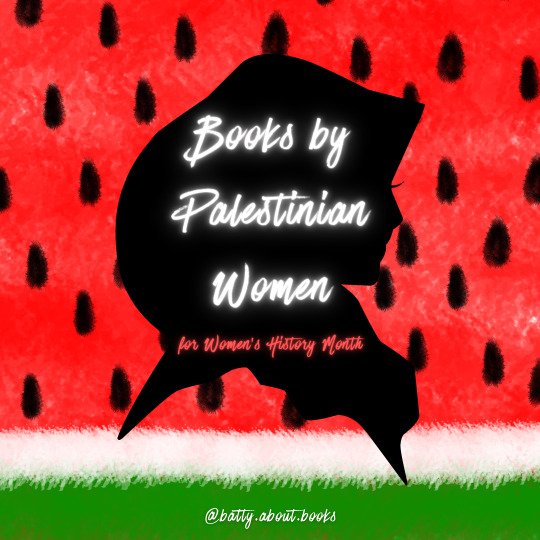
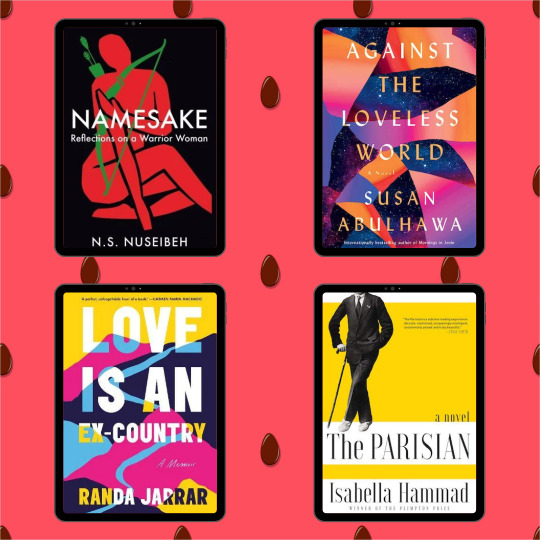
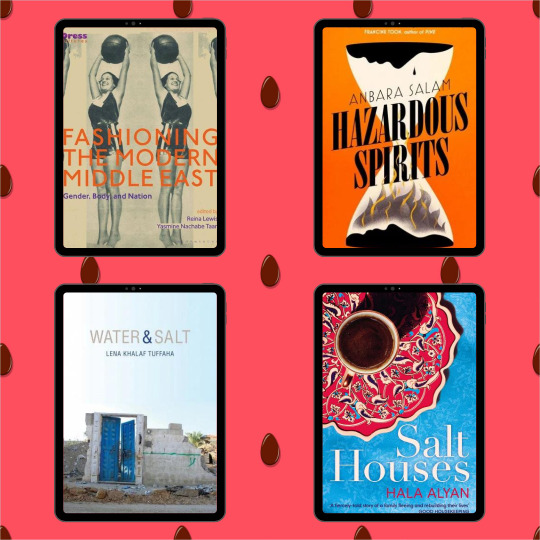
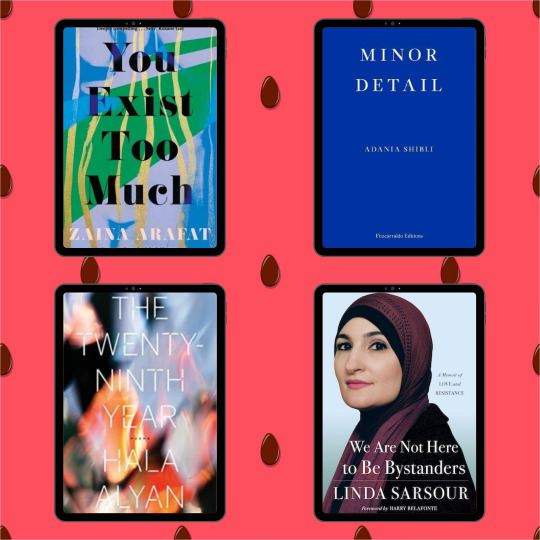
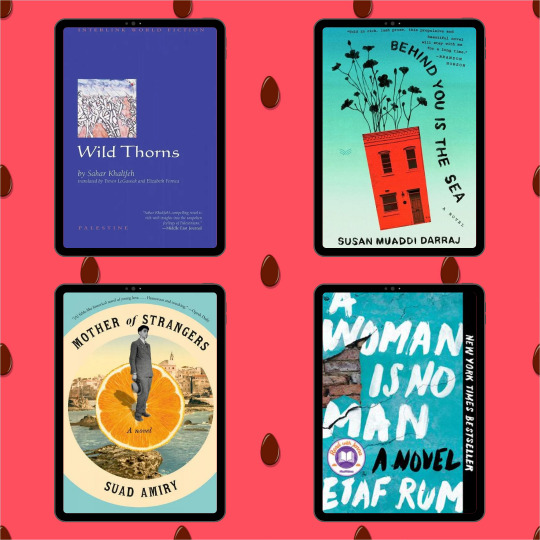


🍉 Women's Month: Books by Female Palestinian Authors 🍉
🍉 Celebrate Women's History Month by elevating and amplifying the voices of Palestinian women writers. Every book, whether it's fiction, non-fiction, or poetry, provides an opportunity for us to learn about the culture, history, and struggles of Palestinian people. Now more than ever, it's important that we support these narratives, shine a spotlight on these experiences, and stand in solidarity as Palestinians fight for liberation. Pay homage to these women, their identities, their ancestry, and ongoing resistance with these books!
🍉 Namesake: Reflections on A Warrior Woman - N.S. Nuseibeh
🍉 Against the Loveless World - Susan Abulhawa
🍉 Love is an Ex-Country - Randa Jarrar
🍉 The Parisian - Isabella Hammad
🍉 Fashioning the Modern Middle East: Gender, Body, and Nation - Reina Lewis and Yasmine Nachabe Taan
🍉 Hazardous Spirits - Anbara Salam
🍉 Water & Salt - Lena Khalaf Tuffaha
🍉 Salt Houses - Hala Alyan
🍉 You Exist Too Much - Zaina Arafat
🍉 Minor Detail - Adania Shibli
🍉 The Twenty-Ninth Year - Hala Alyan
🍉 We Are Not Here to Be Bystanders: A Memoir of Love and Resistance - Linda Sarsour
🍉 Wild Thorns - Sahar Khalifeh
🍉 Behind You Is The Sea - Susan Muaddi Dharaj
🍉 Mother of Strangers - Suad Amiry
🍉 A Woman is No Man - Etaf Rum
🍉 Enter Ghost by Isabella Hammad
🍉 They Fell Like Stars From the Sky & Other Stories - Sheikha Helawy
🍉 The Beauty of Your Face - Sahar Mustafah
🍉 Dear God. Dear Bones. Dear Yellow. - Noor Hindi
🍉 Mornings in Jenin - Susan Abulhawa
🍉 Balcony on the Moon: Coming of Age in Palestine - Ibtisam Barakat
🍉 My First and Only Love - Sahar Khalifeh
🍉 The Book of Ramallah - Maya Abu Al-Hayat
#palestinian books#save palestine#free palestine#womens history month#women writers#international women's day#palestine#batty about books#battyaboutbooks
97 notes
·
View notes
Note
i saw your post about your recommended nonfiction books and can’t wait to read them! would you happen to have any more you suggest? i love learning about the world and how others perceive it ❤️
oh yes i have sooooo many nonfiction recs......it's probably my favourite genre tbh, i try to always read 1 non-fiction for every fiction book i read.
"a natural history of love" and "a natural history of the senses" by diane ackerman. i'm also currently reading her book "the moon by whalelight (and other adventures among bats, penguins, crocodilians, and whales)". she is the most evocative nonfiction writer on planet earth.
i recommended this in my last list but "underland" by robert macfarlane.
"everybody: a book about freedom" by olivia laing - a very good book by a very good writer. queer history, gay liberation, women's rights, reproductive rights, what does it mean for a body to be 'free'.
mary roach, overall, is a very good and very funny non-fiction writer. i've read "spook" (about ghosts and the afterlife) and "fuzz" (about animals and the law) so far, both such good books.
"all about love" by bell hooks. tbh anything by bell hooks.
"the body in pain" by elaine scarry. not for everyone. it's a study on torture and pain and how pain makes and unmakes the world. i read it for a paper i had to write in grad school because i've always been interested in literary trauma theory and it was so informative. also, maggie nelson's "the art of cruelty" and susan sontag's "regarding the pain of others".
"freedom is a constant struggle" by angela davis. so much i could say about this book - it's not dense, it tackles so so much like palestine, prison abolition, the anti-apartheid movement in south africa, and so much more.
anything by rebecca solnit, but start with "hope in the dark" or "the mother of all questions".
"SPQR" by mary beard. if you are at all interested in roman history, this is where to start.
"a short history of nearly everything" by bill bryson is also a very good like....introductory / condensed history book. so so interesting!!
now i haven't read this quite yet but i'm soooooo excited to read "the dawn of everything: a new history" by david graeber and david wengrow.
"four lost cities" by annalee newitz. this book looks at the ancient cities of pompeii in italy, çatalhöyük in turkey, cahokai in the americas, and angkor in cambodia, and delves into how people lived in these cities and how they were built and used. very cool!!!
most of these are history or cultural conversations because those are my favourite non-fiction books to read (i'm not really a big memoir/biography girl). i left off some of my favourite literary criticism books because idk how many people care about that, but if you want those recs lmk!
89 notes
·
View notes
Text
Public Domain Black History Books
For the day Frederick Douglass celebrated as his birthday (February 14, Douglass Day, and the reason February is Black History Month), here's a selection of historical books by Black authors covering various aspects of Black history (mostly in the US) that you can download For Free, Legally And Easily!
Slave Narratives
This comprised a hugely influential genre of Black writing throughout the 1800s - memoirs of people born (or kidnapped) into slavery, their experiences, and their escapes. These were often published to fuel the abolitionist movement against slavery in the 1820s-1860s and are graphic and uncompromising about the horrors of slavery, the redemptive power of literacy, and the importance of abolitionist support.
Narrative of the Life of Frederick Douglass - 1845 - one of the most iconic autobiographies of the 1800s, covering his early life when he was enslaved in Maryland, and his escape to Massachusetts where he became a leading figure in the abolition movement.
Running a Thousand Miles for Freedom by William and Ellen Craft - 1860 - the memoir of a married couple's escape from slavery in Georgia, to Philadelphia and eventually to England. Ellen Craft was half-white, the child of her enslaver, but she could pass as white, and she posed as her husband William's owner to get them both out of the slave states. Harrowing, tense, and eminently readable - I honestly think Part 1 should be assigned reading in every American high school in the antebellum unit.
Incidents in the Life of a Slave Girl by Harriet Jacobs writing under the name Linda Brent - 1861 - writing specifically to reach white women and arguing for the need for sisterhood and solidarity between white and Black women, Jacobs writes of her childhood in slavery and how terrible it was for women and mothers even under supposedly "nice" masters including supposedly "nice" white women.
Twelve Years a Slave by Solomon Northup - 1853 - Born a free Black man in New York, Northup was kidnapped into slavery as an adult and sold south to Louisiana. This memoir of the brutality he endured was the basis of the 2013 Oscar-winning movie.
Early 1900s Black Life and Philosophy
Slavery is of course not the only aspect of Black history, and writers in the late 1800s and early 1900s had their own concerns, experiences, and perspectives on what it meant to be Black.
Up From Slavery by Booker T. Washington - 1901 - an autobiography of one of the most prominent African-American leaders and educators in the late 1800s/early 1900s, about his experiences both learning and teaching, and the power and importance of equal education. Race relations in the Reconstruction era Southern US are a major concern, and his hope that education and equal dignity could lead to mutual respect has... a long way to go still.
The Souls of Black Folk by W.E.B. Du Bois - 1903 - an iconic work of sociology and advocacy about the African-American experience as a people, class, and community. We read selections from this in Anthropology Theory but I think it should be more widely read than just assigned in college classes.
Darkwater: Voices from Within the Veil by W.E.B. Du Bois - 1920 - collected essays and poems on race, religion, gender, politics, and society.
A Negro Explorer at the North Pole by Matthew Henson - 1908 - Black history doesn't have to be about racism. Matthew Henson was a sailor and explorer and was the longtime companion and expedition partner of Robert Peary. This is his adventure-memoir of the expedition that reached the North Pole. (Though his descriptions of the Indigenous Greenlandic Inuit people are... really paternalistic in uncomfortable ways even when he's trying to be supportive.)
Poetry
Standard Ebooks also compiles poetry collections, and here are some by Black authors.
Langston Hughes - 1920s - probably the most famous poet of the Harlem Renaissance.
James Weldon Johnson - early 1900s through 1920s - tends to be in a more traditionalist style than Hughes, and he preferred the term for the 1920s proliferation of African-American art "the flowering of Negro literature."
Sarah Louisa Forten Purvis - 1830s - a Black abolitionist poet, this is more of a chapbook of her work that was published in newspapers than a full book collection. There are very common early-1800s poetry themes of love, family, religion, and nostalgia, but overwhelmingly her topic was abolition and anti-slavery, appealing to a shared womanhood.
Science Fiction
This is Black history to me - Samuel Delany's first published novel, The Jewels of Aptor, a sci-fi adventure from the early 60s that encapsulates a lot of early 60s thoughts and anxieties. New agey religion, forgotten technology mistaken for magic, psychic powers, nuclear war, post-nuclear society that feels more like a fantasy kingdom than a sci-fi world until they sail for the island that still has all the high tech that no one really knows how to use... it's a quick and entertaining read.
59 notes
·
View notes
Text
[“Several contributors to A Woman Like That acknowledged that exploring the territory of their own coming out in writing was unexpectedly difficult. Seasoned writers told me how arduous, even painful, it was to explore coming-out memories that had long been held under pressure at a depth. One novelist said that her family’s rejection of her as an open lesbian had been too agonizing to revisit; she was unable to complete her story. Another, author of a soul-searching memoir and surely no coward, wrote a haunting piece about her first erotic experience with a woman, but withdrew it when she remembered that the words “lesbian and bisexual” would appear in the book’s subtitle.
These are indeed powerful words. I am deeply indebted to the writers who are free to embrace them.
Many writers in this collection recall childhood desire, embryonic lesbian hunger, and the innocence and mystery of those feelings on the brink of collision with the straight world. One writer asserts that she was “born queer,” while another confesses to the sin of “converting”—implying that, contrary to current rules of political correctness, some feel they have chosen to be lesbians. Some write with youthful ebullience and wit of adventures as “sex-positive” lesbians, with almost a gasp of surprise at the seeming absence of oppression in their lives. A handful write of uncommonly loyal families that nurtured independence in childhood and remain a source of strength to their unconventional daughters. Some contributors write of harsh punishment rendered for sexual nonconformity and of the survival skills and moral intelligence they have wrested from their experiences. Two write of their incarceration in mental institutions as young gay women, and of the exhilaration of release. Another, stunned by the abrupt firing of teachers rumored to be lesbians, learns that even a “progressive” environment may be unapologetically homophobic; her knowledge of danger ultimately empowers her to speak against injustice. One writer, who tells of coming out to the sons of whom she has lost custody, speaks of having cracked open their small universe—a shattering, but one that allows light and the possibility of new knowledge and connection.
A number of writers in this collection tell coming-out stories that are not about a single defining moment but rather about a continuum of experience. They recall many passages—a gradual shedding of false selves, an ongoing process of self-discovery and self-naming. One writer, nearly deported from the U.S. for her outspoken political writing, equates coming out with the freedom to explore deeper places in her own psyche. A writer in her seventies tells movingly of her failure to name herself a lesbian at a reunion of those who as children were transported to safety in England to escape the Nazi death camps. Next year, she resolves, she will come out to them. Another, Another, in the form of a diary of a week in the present year, reminds us that, regardless of how secure our identities, we are forced to come out as lesbians each time we intersect with the heterosexual world, or remain invisible as we have been for centuries.”]
Joan Larkin, from a woman like that: lesbian and bisexual writers tell their coming out stories, 2000
90 notes
·
View notes
Text
HD Books / Writing fic recs
Here are a few drarry fic recs involving books or writing. Listed in alphabetical order, as always.
Annus Mirabilis by Ren [39k]
Harry and Malfoy are trapped at Hogwarts around the time the school was founded. Stuck with a different way of doing magic, with no chocolate, and with each other, they have to find a way to work together if they want a chance to go home.
Dear Diary by AWickedMemory [20k]
// This can’t possibly go worse than the last time I kept a diary. //
After the war, Harry picks up a journal to write in… and it writes back. Luckily, it’s not a Horcrux on the other end this time.
Faint Indirections by ignatiustrout [29k]
Draco Malfoy is the last person Harry expects to turn up in Boston, Massachussetts. But now he’s here, and he won’t stop requesting books from the library where Harry works.
He Who Must Not Be Normal by @letteredlettered [40k]
Potter has fame and fortune and posh clothes and all he wants is a simple life. Draco has a flat and a cat and a steady job and all he wants is a complicated life. Which makes you think this story has something exciting like body-swapping, but it doesn’t. Instead it has Indian takeaway and a blue jumper and people wanting a whole lot of what they can’t have, discovering themselves as they discover each other.
If We Were Honest by daisymondays / @gracie137blogs [26k]
Two years ago, Draco and Harry had a whirlwind secret romance that ended in heart-break. Since then Draco’s written a best-selling novel based on their relationship, but with one key difference—the characters get a happily ever after. Now Harry and Draco are reunited for the first time since their break-up, but can they rewrite their own ending?
Love Bites, Or How Draco Malfoy Learned to Let Go and Celebrate His Allure by @m0srael [50k]
Recently-turned Draco Malfoy is doing his very best to be a normal, productive, contributing member of wixen society. So far, he’s managed to keep his bloody little problem a secret, even from his best friends. But when the professional opportunity he’s been dreaming of finally falls in his lap, he finds himself with much more than just a potential promotion. Will a profile on a new creature-exclusive dating app, a wolfy stranger who seems hellbent on liking Draco just the way he is, and a little self-confidence help Draco finally love himself and his newfound community?
Orion in the Sky by space_wingding [30k]
Draco Malfoy owns a bookshop in the Lake District. He’s also cursed. Enter: Harry Potter.
Per Solum Lacuna: By Words Alone by Azhure [560k]
A set of enchanted journals bring solace to two very unlikely lost souls. Whoever said the art of penmanship was lost? This is a wizarding twist on the old fashioned art of correspondence (or the modern art of Internet chatting). What will happen when the mystery writers finally discover the identity of their counterpart? Join this star crossed pair as they obliviously chat to each other; along the way learning about life and love. Find out what will happen when their own voyages of self discovery lead them to the most unlikely of places. This is eventual HP/DM, but other pairings for the protagonists along their journey.
The Price We Pay for Wings by Frayach [13k]
Books have the power to shape young lives. At least that is the hope of the anonymous author of a best-selling series about a Muggle boy and his best friend on the eve of a world war. But stories do more than just shape the future: they can redress the wrongs of the past as well. But only as long as it’s not too late…
Reading Malfoy by @femmequixotic [15k]
After thirteen years of hiding himself away in Muggle London, Draco Malfoy shows up again in the wizarding world–with a wickedly amusing memoir in hand. Harry doesn’t want to read it. Really. He doesn’t.
The Romantic Prawn Who Loved Christmas by @bixgirl1 [39k]
When Draco, forced into sharing a room with Potter for the year, finds out that Potter has a sleepwalking problem, he expects the odd conversations and the weird games of chess.
What comes as a complete shock are Potter’s other activities…And why he seems so intent on having Draco join him.
(Relax. It’s just like a holiday Hallmark movie! …With, uhm, sleepwanking.)
Sourdough by @academicdisaster24 [17k]
Draco writes romance novels and doesn't leave his apartment much. Harry bakes bread and sells it to Draco. Draco is quite weird. Harry might like that.
Sunseeker by @shiftylinguini [15k]
Harry is a struggling writer.
Namely, he is struggling with: writing his next book, dealing with his agent, finding a decent tea strainer, fielding his friend’s concern over the aforementioned book, and figuring out who the cat loitering in his garden belongs to.
He also has a slight liking-Malfoy problem. Okay, he has a massive liking-Malfoy problem.
Teach Me, Life; Guide Me, Love by @kiraohara [79k]
Revelations both painful and joyous set the markers in the path of every life. Thankfully, Draco has spectacular company for the journey.
Verba Volant by shushu_yaoi_lj / @orange-peony [34k]
The first letter arrives after the Trials.
Harry unfolds the parchment and his eyes open wide when he realises who it’s from.
He soon finds himself waiting for those letters to arrive, staring at the window in search of Malfoy’s owl.
He wants to know more.
When It Alteration Finds by momatu [55k]
After the war, Harry left most of the Wizarding world behind and built a new life for himself in the Channel Islands. He opened a bakery and is happy with his life. Draco is a fiction author who writes under a penname, and he’s currently suffering from writer’s block. His agent suggests he try writing in a new environment and rents a cottage in the Channel Islands for him.
I hope you enjoy these stories as much as I did!
118 notes
·
View notes
Text
Zawe Ashton on resilience, tackling complex roles and the fight for on-screen representation
The actress took to the stage at the 2023 Bazaar Summit

When Zawe Ashton looks back at her career so far, she’s a little surprised: not at her own success, but at how she’s managed to navigate a notoriously tough industry so well. “When I talk about what I’ve been through, I think, why have I kept going?” the actress and writer told the audience at the 2023 Bazaar At Work Summit, at which she was a headline speaker. “I wonder if, to even become an actor, there needs to be something inside you that is already a little bit fractured. I think there’s something within me that somehow knows this level of crazy. When it gets really hard is when I feel my strongest or most determined.”

Anyone who has watched and loved the cult favourite TV show Fresh Meat will be very thankful indeed that Ashton did keep going. Her character – the straight-talking, drug-taking, chain-smoking and anti-establishment Vod Nordstrom – was a highlight of Jesse Armstrong’s hit series. The popularity of the sitcom-style show (and particularly of Vod) made Ashton a household name and, to this day, it’s a role she’s proud of playing. “Vod was very left-field, free-thinking and probably, I would say, a queer character without that being made explicit,” she said. “Fresh Meat was 11 years ago now, but there’s still a whole new wave of people who come up to me – lots of young actresses, of every ethnicity – who say thank you to me for being smelly, unlikeable, strange and punky, because there aren’t a wealth of women who are doing that on screen.”

Ashton clearly feels passionate about portraying real women in her work. In 2019, she published a fictionalised memoir, Character Breakdown, the title of which refers to the couple of lines an actor will receive with a script, which describe who the character is – for women, these mini biographies are often laughably simplistic and purely aesthetic. “They go from one extreme to another,” Ashton sighed with disbelief. “Where do we draw the line? If you’re not seeing women’s humanity, if you’re not seeing a full human life when you’re thinking about the ways in which you’re putting these descriptions together, then you’re not valuing women. And that’s a much bigger conversation than my industry.”

Throughout her career, Ashton has fought to play complex roles and has always emphasised the importance of making multi-faceted women of every ethnicity visible on screen. When she took the role of Vod, “growing up as a young, biracial girl in Hackney,” she was “willing to do whatever it took to make that character as edgy and authentic as I felt she could be, so that it would invite anyone not seeing that kind of representation to feel really seen”. In 2022, Ashton scored a role in the period drama Mr Malcom’s List, which was a seminal moment for her – and one which she credits to the success of Bridgerton's diverse casting. “I had never seen any actor who looked like me invited to the table to perform [something like that],” she said. “I hadn’t known necessarily that I was hurting so much, until I saw that representation happen and the success of it take everyone by storm.”
Since then, Ashton has continued to push the envelope. This year, she played villain Dar-Benn – a role traditionally written as male – in The Marvels, opposite Brie Larson as Carol Danvers. “The process of learning stunts and fighting is probably one of the most empowering things I’ve done!” she laughed. “But when I thought the film was finished, I got pregnant and had my baby. And then they told me to come back and reshoot basically the whole movie. That has been the biggest journey for me: my physical wellness, my ability to endure, to mentally switch back into that place postpartum and come back to kick some ass again.” Perhaps unsurprisingly, a boundary-breaking superhero feels like Ashton’s best-suited role to date. (x)
58 notes
·
View notes
Text
Limits of Propaganda in the Augustan Regime
I saw a neat post earlier about how Augustus used propaganda to justify his control of Rome and establish permanent one-man rule. It got me thinking about what we picture when we say "propaganda," how Roman propaganda differed from modern propaganda, and how we talk about the interactions between governments and their people.
Augustus' cult of personality has some parallels with monarchist propaganda in early modern Europe, and with authoritarian governments today. But there were also major differences that I think we need to remember, or else we may wrongly project modern assumptions onto the past. In particular, I think the predominance, effectiveness, and superficiality of Augustan propaganda are often overstated. And I think this distortion reinforces a classist bias in our perception of the people of Rome, a bias that contributes to the erasure of ordinary people's contributions to history.
This isn't a formal essay, and I'm not a historian. I may have misremembered some things. But, if you'd like to hear me ramble...
How powerful was Augustan propaganda in shaping people's views of the government?
The word "propaganda" was popularized in the 20th century, in association with mass communication. Modern governments can ensure their propaganda is seen by millions of people at once, and restrict access to opposing viewpoints. Massive amounts of money, equipment, and professional teams are employed to spread these messages.
The only mass media in Augustan Rome were coins, which Augustus could only put very limited text and images on. He erected numerous monuments, but those are limited to a few paragraphs at most, and only to the people who visit them. He could patronize writers and poets like Livy and Vergil, but even they lacked the reach of television, radio or the internet. And all of these methods would have been far more expensive than the mass media of today.
Augustus' propaganda wasn't novel. Roman leaders had been stamping their messages onto coins, monuments, writing memoirs and hiring poets for centuries. Throughout his reign people still would have seen coins and monuments from the republican period, and read the works of Cicero, Brutus, and other republican leaders. In the same way most people today have learned not to trust everything they see on TV, most Romans would have known not to believe everything they saw on monuments, coins, or in state pronouncements.
Nor was Augustus able to limit the spread of contrary narratives like modern dictators can. The Roman government was extremely barebones by today's standards, lacking the bureaucracy and resources to surveil the population. Most Romans didn't get their news from public announcements, state-sponsored art, or politicians' books, but from gossip, letters, and their own information networks.
Over half of all male Romans traveled abroad at some point in this period (Mary Beard, SPQR, ch. 5). They had many different viewpoints available, and other sources of information about what was happening in the provinces. Augustus thus could only bend the narrative to his benefit so far. When several legions were annihilated in Teutoburg Forest in 9 CE, he didn't even try to cover it up; people would've called him on it.
Augustus had more control over how he presented himself and his family to the public than over the narrative of tangible events in the world. Thus most of his propaganda either focuses on shaping his image of himself, his family, or on the personal character of Antony and Cleopatra instead of events Romans could verify or disprove.
But he couldn't stop information from leaking, family scandals from happening, or rumors from spreading. He exiled his daughter Julia, in part for her extramarital affairs, but also because the notoriety of the scandal undermined the squeaky-clean "Roman family values" image he intended for his family to present. When he sent Agrippa to govern the eastern provinces, rumors abounded that some rift had formed between the two. Whether or not such a rift actually happened, the fact that the rumor existed, and survived for 150 years into Suetonius' era, shows how limited Augustus' control of public perception actually was.
How independent were Roman citizens, soldiers, and senators?
These are three very distinct groups that behaved in different ways. Let's start with the general public.
The Roman People
The evidence is clear: we know people organized public protests and petitions throughout Augustus' reign, and even spoiled elections sometimes by voting for the "wrong" candidates.
A group of women took over the forum to protest his tax hike in 42 BCE, despite a wave of proscriptions. He was nearly stoned to death by an angry mob in 39 BCE. The Romans repeatedly petitioned for Julia's freedom, and as late as 9 CE we hear of protests against his marriage laws.
Why did the public express themselves so freely? Well, for one thing, Augustus chose not to suppress popular demonstrations. In fact, he seems to have used the semblance of "free speech" as a tool to deflect accusations of tyranny. By cultivating an image of himself as a moderate who permitted public dissent, he made his political dominance appear less authoritarian and more palatable to the people of Rome.
Augustus probably also thought it was impossible to control what people said, so didn't bother to try. In one of his letters to Tiberius, Augustus says as much:

Suetonius, Augustus, 51
Another big factor was that many public protests tried to persuade him to take on more power. They repeatedly demanded that he take up the dictatorship, or tried to elect him consul when he wasn't running. And no, this doesn't seem to have been the "fake elections" you see in modern dictatorships. The reason is that people's trust in the Senate's competence had collapsed, so when national crises arose like famines, plagues, or debt problems, they tried to make Augustus take back the reins, instead of sharing the power with the Senate as he pretended he was doing.
Which brings us to Augustus' bizarre relationship the Senate.
The Senatorial Class
How independent were the senators? Suetonius gives us a raucous picture:

Augustus also reintroduced competitive elections. Not free, really - everyone knew Augustus' power far outweighed the consuls and praetors. But we do have records of candidates attempting to bribe voters and slinging accusations at their opponents, similar to republican times. This was another way that Augustus tried to distance himself from the dictatorships of Caesar and Sulla, and make his authority palatable to people who valued republican liberty.
He also collaborated with senators behind the scenes, and selected some of them as advisors and proxies for introducing legislation. Augustus' rule was negotiated in a series of settlements, public and private, with the same class of people who had killed Julius Caesar for threatening their place in the public order.
Augustus needed the aristocracy's skills, education, and resources to administer the empire. He also needed to placate them enough to avoid getting the Ides of March Special. They, in turn, needed a way to maintain their dignitas and roles in government, which had traditionally been conferred by elections. By permitting elections, incorporating senators into policy-making behind the scenes, and giving them the outward appearance and status of their old authority, Augustus satisfied them enough to stabilize his rule.
However, the value of elections, and of being in the Senate, clearly declined over time. In the second half of his reign senatorial attendance declined so sharply Augustus introduced penalties for senators not showing up to "work." Eventually elections for the high magistracies were phased out, and the Senate was allowed to elect consuls from among themselves. This was actually popular with senators, since it spared them the expense of campaigning.
And although Augustus did permit senators' input into his government, his control steadily increased over time. Part of this was official, as re-settlements granted him additional powers. And part of it was de facto, as he simply outlived everyone who had experience managing the government. Augustus' longevity, experience, and informal network of advisors effectively made his household the hub of government policy. (His nepotistic habit of giving his relatives the most important jobs also contributed.) Meanwhile, the Senate had a sort of "brain drain" effect as a new generation of senators grew up without the experience of running the state themselves.
By the ascension of Tiberius in 14 CE, senatorial autonomy was dead. Even when Tiberius attempted to step back from government and encouraged the senators to state their own opinions, this only resulted in paralysis. He could not replicate the personal, unofficial relationships Augustus had developed to govern without appearing "tyrannical," and tension between the Senate and emperors would plague Rome for another 200 years.
The Military
Although Augustus took pains to disguise it, we should never forget that he was a military dictator. His power came first and foremost from the loyalty of the army, and their loyalty depended on getting paid. The last great threat to his rule wasn't Antony or Cleopatra, but a huge mutiny in Italy after the Battle of Actium. If he hadn't annexed Egypt and distributed its riches to his troops, there's a high chance he would have been overthrown.
Augustus also needed to convince the legions and public of his military ability, and thus that Rome was safe under his rule. He was not a gifted commander, but he was usually good at selecting them, most notably in Marcus Agrippa, Drusus, Tiberius, and Germanicus. On the other hand, the catastrophic loss of several legions in Teutoburg Forest seriously frightened him. He feared a loss of public confidence, and thus rebellions and political rivals, and quickly sent Drusus and Tiberius with their armies to retaliate.
Augustus established a permanent army to guard the entire empire, which strained the empire's budget to its limit. He managed to pay for it all, barely. Later emperors would repeatedly run into mutinies and even be overthrown by troops who weren't satisfied with their wages.
Augustus' reign was a difficult balancing act between the needs of many competing interest groups, especially early on. After multiple civil wars, the state was poor, the people were exhausted and traumatized, the Senate and citizens feared each other, Romans opposed provincials, soldiers opposed civilians - it was a mess. It's hard to describe the damage to Rome's social and economic infrastructure.
Perhaps the greatest achievement of Augustus' reign was that he managed to navigate between all of these groups, get each of them to trust him to look out for their interests, and gave Roman society enough time to knit itself back together. To win that trust, he couldn't rely on bribes and propaganda alone. He had to prove it through action.
Augustan propaganda had to be justified through tangible benefits, not mere words and imagery.
The word "propaganda" is usually used to refer to rhetoric, advertisements, and manipulation. It connotes hollowness and subterfuge. But Augustus did not trick people into liking him by just hiring the right poets and erecting statues. His most effective propaganda was demonstrated through public renovations and the assurance of public order.
The bar wasn't high to clear. We have to remember that Augustus wasn't a dictator replacing a functioning republic; he was introducing a stable government with competitive (but not free) elections after 20 years of civil war, and another ten years of political violence before that. Peace alone was a major reason why people accepted his rule.
The quality of life for both Romans and provincials mostly improved during his reign, too. From Marcus Agrippa fixing the sewer system and providing the entire city with clean water, to Rome's first permanent fire brigade, to increased economic mobility, to safer long-distance travel, to stabilizing the grain supply, even down to individual tax disputes and court cases Augustus encountered while touring the provinces. The Romans would also have seen Augustus' military victories as a form of public service, a way of enriching the empire and restoring national pride. (And they were officially his victories, since he remained the commanding officer, even if the campaigns were masterminded by Agrippa or another subordinate.)
I think that history books sometimes frame Augustan propaganda as a sort of trick to make the populace accept one-man rule. But you can't really separate the effects of his propaganda from his demonstrable actions that most Romans approved of. The Romans were not simpletons, and they weren't afraid to express their anger with him violently. (Even with the Praetorian Guard present: a mob attacked him and his soldiers in 39 BCE.) Augustus was testing out a fragile and experimental form of government, and had give people results.
That said, we should not attribute the benefits of Augustus' rule to autocracy. We certainly shouldn't use it to justify authoritarianism, as many fascists have attempted. Augustus' government was better than an ongoing civil war; that does not mean it was better than a democracy. And the downsides of autocracy rapidly took effect after his death: first in Tiberius, who initiated the first purges since 42 BCE; then with Caligula, who was...well, Caligula.
If anything, I think Augustus' reign shows how goddamn hard it is to kill people's desire for liberty and their voice in government. If we overlook the protests, the riots, and the constant need for the princeps to justify his regime with military and domestic success, then we erase the input of the common people. And that contributes to a classist view of history in which only rich, powerful men can make meaningful contributions.
Augustus used propaganda, absolutely. But the Roman people were not satisfied with pretty words and images. They paid attention to what the state was doing, they expected it to serve, feed, and protect them, and they even intervened in issues like Julia's exile that didn't personally affect them.
Perhaps we should give them a little more credit.
Further Reading/Watching
Mary Beard, SPQR
Anthony Everitt: Augustus: The Life of Rome's First Emperor
Adrian Goldsworthy, Augustus: First Emperor of Rome
Erich Gruen, The Last Generation of the Roman Republic
Robin Seager, Tiberius
Historia Civilis (YouTube channel)
#jlrrt speaks#octavian#propaganda#hot takes with jlrrt#once again i'm not a historian this is all just my opinion#i would totally stuff augustus into a locker and then run like hell before agrippa could catch me#jlrrt essays
63 notes
·
View notes
Text
Free Resources I Made for Nonfiction Book Writers - $$$
If you're writing a nonfiction, non-memoir book, you're welcome to join my free monthly video chat group Authors of Nonfiction Books in Progress (ANBIP.) If you join you'll get the recap emails and the invites to meetings, but if you don't like meetings, then just enjoy the emails. Note that it's sort of a professional group so we talk about book writing as more of a job than some universal higher calling or whatever.
Through that, I've had a few people ask me for some of the following documents in this journey, so I decided, why not just make a copy for sharing so that anyone can find them, instead of just people who email me? Feel free to use these as samples, share them, whatever. But first:
What I wish I had known before the book:
While I'm here, before you start your book proposal, I learned too late that you can get paid $80,000 to write one at a journalism fellowship! People do that at the Knight Science Journalism Fellowship, The Scripps Fellowship at the Center for Environmental Journalism, and probably the other Knight Journalism fellowships that I haven't looked into. So, keep your ears open for fellowships if you're thinking of starting a nonfiction book proposal.
To the resources...
Results from my agent search
Note: most people suggest Publisher's Marketplace, so, even though I didn't like my results from looking there, there is surely a reason everyone else does.
My Book Proposal & how I contacted the agent
Result: contract with MIT Press to write a book about dead animals and $50,000 advance.
My Proposal for the Sloan Grant
Result: I got $56,053 for the book Carcass. Also, at least two other people in my group got the grant, and one mentioned that she never would have known about it if it weren't for ANBIP, nor would she have applied!
List of suggested grants to apply to
Note: most of these book grants--and most legit ones in the world--require a traditional contract. I find a lot of "prizes" for people without trad contracts are not grants at all, but an effort to get you to think you "won" what is, in effect, a contract. That's fine if the contract is fine, but don't let them stroke your ego with the words "you won" if you think you could get a better contract elsewhere. A grant is more like free money.
I also got $500 and some free resources--and miiiiight get some more money in the future?--from a program called Investing in Wyoming's Creative Economy, so, maybe your state has something similar. IWCE is brand new (started in 2023) so we'll see if it even continues on. MANY funding opportunities only exist for a few years before they run out.
My contract with my fact-checker
How I found Science Advisors & how I described their task
Note: I really just made this up, as with the contract with the fact-checker. I'm just some person and I'm only giving these to you because I couldn't find anyone else's that may have been done better! Make a copy, read through it carefully, and make all the changes you need to yours. Or if you already have a better one to look to, send it to me and LMK if I can send it to my colleagues at ANBIP!
Spreadsheet National Park Artists in Residences Applications
Note: I have never got any of these, and most don't pay or work well for writers, TBH. But I know a science writer who did get one. Also, I only included the ones I liked in this spreadsheet and left out the historic parks. Here's a map of more and the National Park Arts Foundation. I only apply to free ones because I noticed that one residency said they got 800 applications and the fee was $120, which, mathematically, is like paying $96,000 to do it (and that one paid $4,000 to the winner.) Also: state parks and BLM land have Artist in Residence programs!
Copy of #PublishingPaidMe spreadsheet
(I didn't make this, and I don't recommend making graphics or pivot tables from this as some of the numbers are def wrong)
Book Progress thermometer
That's all for now! If you found this helpful, just pay it forward by being open with your experience for the next people who ask you.
PS. My next task is finding events to hire me to do talks about the topic of my book, which is dead animals. I know some authors make plenty of money on speaker fees after their book is launched! But I'm struggling to find events/places to speak because I mostly only want to go places where I am paid, but I also worry about a conflict of interest if I'm paid by organizations I've covered--or even, orgs that promote or protest anything that I've covered in general! I don't want to be a PETA-funded journalist or a Safari Club International-funded journalist either. If you have experience with setting up a book tour where you profited financially and were journalistically clear, I'd love to hear your story!
51 notes
·
View notes